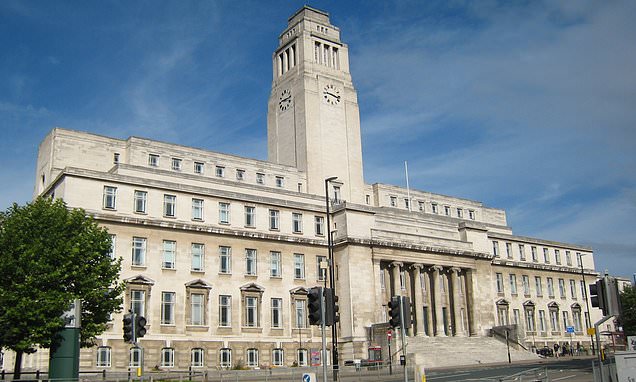University of Leeds’ new 12-page trans awareness guide urges students not to use ‘he’ to describe people generally in latest pronoun controversy
- Insiders at the university claim bosses are giving into ‘gender identity ideology’
University of Leeds lecturers have come under fire after urging students and staff against using ‘he’ to mean people in general in a new trans awareness guide.
Lecturers published the 12-page pamphlet with the title From Trans Awareness to Trans Advocacy in a bid to advise people on how to approach pronouns, transitioning and flagging transphobic behaviour.
In a section on how to ‘think about gendered language’, it says using ‘he’ pronouns when referencing characters in historic English writing, which has been a standard feature in classic and religious works, should be challenged in lectures.
The booklet, which has been obtained by The Daily Telegraph, states: ‘Some published texts, particularly older sources, might use ‘he/him’ to refer to people in general.
‘It’s not always possible to use inclusive texts, but you can raise a discussion about the use of gendered language with your group and make it clear that this is not regarded as acceptable or current practice.’
Lecturers at the University of Leeds (pictured) have published a 12-page pamphlet with the title From Trans Awareness to Trans Advocacy
It comes after it emerged at least seven UK universities are offering separate accommodation for gay and trans students starting courses in September.
Sheffield, Cardiff, Bristol, Bath, Southampton, Southampton Solent and Essex universities said they have introduced the measure to keep LGBTQ+ students safe from ‘homophobia, biphobia and transphobia’ by straight flatmates.
But critics likened the move to social segregation and said it was ‘patronising’ to think that homosexual students wanted their own halls.
Now, a leaflet going around the University of Leeds has sparked a backlash from those within the Russell Group university who claim bosses are giving into ‘gender identity ideology’ by publishing ‘some seriously bonkers’ advice, while ignoring concerns at the same time.
The guide reportedly uses the term ‘cisgender’ on multiple occasions in reference to people who ‘continue to identify with the sex assigned at birth’, but it insists it is ‘not a slur’ – something gender-critical campaigners have claimed.
‘Allies can play a solidarity role in trans justice, but it’s important that allies recognise the power and privilege they have as cis people,’ the guide continues.
Another part of the publication describes how ‘gender euphoria’ is ‘the joy and pleasure of being recognised and affirmed in one’s own identity’.
Staff and students have also been urged to start ‘using your pro-nouns in email signatures, and putting your pronouns next to your name during video calls’ to ‘contribute to a safer space for trans people’.
The pamphlet, which has links to the website of trans charity Mermaids, says it is ‘courteous and respectful to interrupt’ conversations on campus and say ‘excuse me [person being misgendered] uses ‘[insert correct terms]’ pro-nouns’ if they hear someone using the incorrect pronouns.
Insiders at the University of Leeds claim bosses are giving into ‘gender identity ideology’ by publishing ‘some seriously bonkers’ advice, while ignoring concerns at the same time. (File image)
Leading historian Professor Jeremy Black, previously of the University of Exeter, told The Telegraph that the pronoun ‘he’ had been used throughout ‘most of history – most works would use that without any suggestion of it being pejorative about women’.
It comes after the Government last week delayed its own deadline to provide schools in England with guidance on gender issues.
Schools are facing challenges such as when children want to change their name, use different pronouns and wear different clothes in a process known as social transitioning.
A University of Leeds spokesman said: ‘[It]is committed to promoting and positively encouraging free debate and a wide range of views.
‘We strive to maintain an environment of freedom of expression and where individuals are able to challenge ideas and beliefs within a culture of tolerance, dignity and respect for everybody.’
Source: Read Full Article
-
Kemi Badenoch vows to stop police intervening in social media clashes
-
Police seized laptops and a memoir from the home of a witness to Tupac Shakur’s 1996 killing – The Denver Post
-
Revealed: Britain's best 40 fish and chip takeaways shortlisted
-
Delivery driver killed five-year-old then carried on to drop off takeaway
-
Trash pile in Loveland causes neighborhood headaches – The Denver Post



